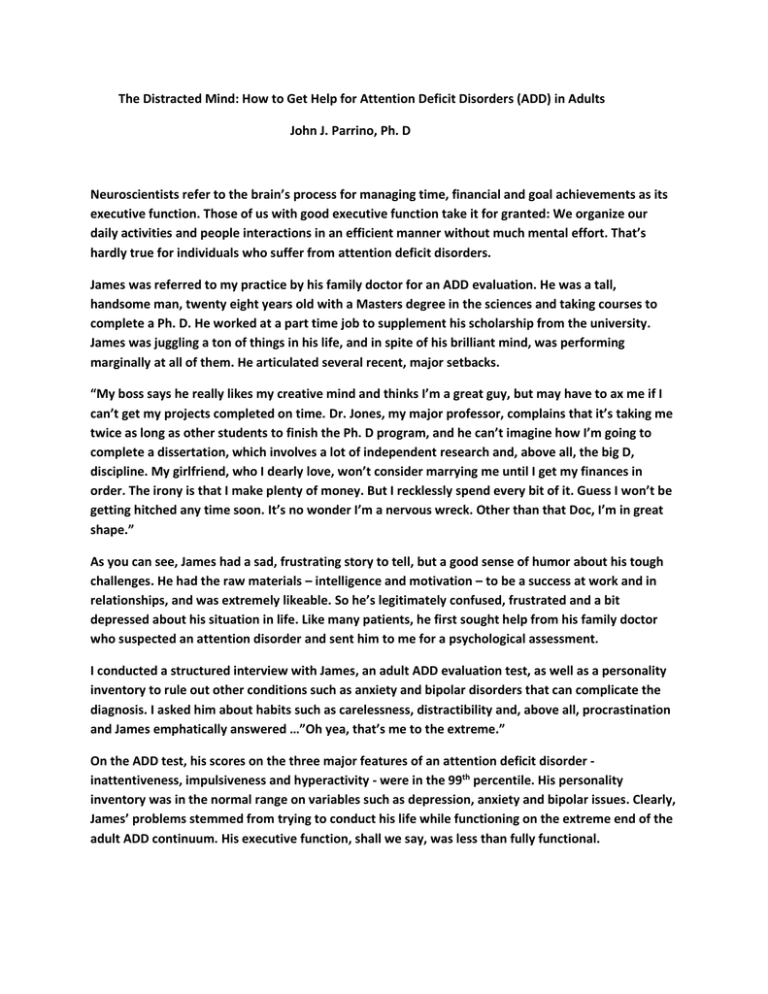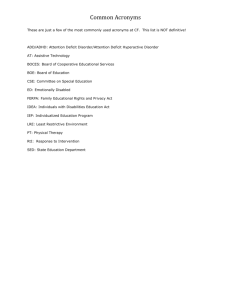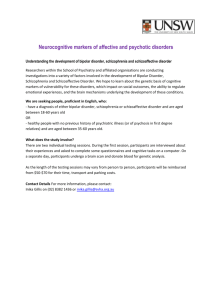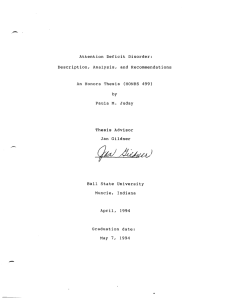THE DISTRACTED MIND: How to Get Help for
advertisement

The Distracted Mind: How to Get Help for Attention Deficit Disorders (ADD) in Adults John J. Parrino, Ph. D Neuroscientists refer to the brain’s process for managing time, financial and goal achievements as its executive function. Those of us with good executive function take it for granted: We organize our daily activities and people interactions in an efficient manner without much mental effort. That’s hardly true for individuals who suffer from attention deficit disorders. James was referred to my practice by his family doctor for an ADD evaluation. He was a tall, handsome man, twenty eight years old with a Masters degree in the sciences and taking courses to complete a Ph. D. He worked at a part time job to supplement his scholarship from the university. James was juggling a ton of things in his life, and in spite of his brilliant mind, was performing marginally at all of them. He articulated several recent, major setbacks. “My boss says he really likes my creative mind and thinks I’m a great guy, but may have to ax me if I can’t get my projects completed on time. Dr. Jones, my major professor, complains that it’s taking me twice as long as other students to finish the Ph. D program, and he can’t imagine how I’m going to complete a dissertation, which involves a lot of independent research and, above all, the big D, discipline. My girlfriend, who I dearly love, won’t consider marrying me until I get my finances in order. The irony is that I make plenty of money. But I recklessly spend every bit of it. Guess I won’t be getting hitched any time soon. It’s no wonder I’m a nervous wreck. Other than that Doc, I’m in great shape.” As you can see, James had a sad, frustrating story to tell, but a good sense of humor about his tough challenges. He had the raw materials – intelligence and motivation – to be a success at work and in relationships, and was extremely likeable. So he’s legitimately confused, frustrated and a bit depressed about his situation in life. Like many patients, he first sought help from his family doctor who suspected an attention disorder and sent him to me for a psychological assessment. I conducted a structured interview with James, an adult ADD evaluation test, as well as a personality inventory to rule out other conditions such as anxiety and bipolar disorders that can complicate the diagnosis. I asked him about habits such as carelessness, distractibility and, above all, procrastination and James emphatically answered …”Oh yea, that’s me to the extreme.” On the ADD test, his scores on the three major features of an attention deficit disorder inattentiveness, impulsiveness and hyperactivity - were in the 99th percentile. His personality inventory was in the normal range on variables such as depression, anxiety and bipolar issues. Clearly, James’ problems stemmed from trying to conduct his life while functioning on the extreme end of the adult ADD continuum. His executive function, shall we say, was less than fully functional. How does this paradox exist in the brain? A highly intelligent, hardworking, motivated-to-do-wellindividual performs poorly at work, can’t manage his finances and is about to lose the love of his life. Here are some research-based answers to this mind-body mystery. First, with the help of one of the foremost experts in the field, Dr. Thomas E. Brown and his book, Attention Deficit Disorder (Yale University Press, 2005), let’s dispel a commonly held MYTH: “ADD is just a lack of willpower. People with ADD focus well on things that interest them, and they could focus on other tasks if they really wanted to.” According to Dr. Brown, this is the FACT: ADD looks like a willpower problem, but it isn’t. It’s a chemical problem that undermines the management systems of the brain. Most people are shocked by that fact, and James was no exception. Yet the consensus among ADD experts is that this disorder is neurobehavioral; that is, a brain dysfunction that provokes behavioral problems. To reduce my patients’ frustrations and self critical thinking, I often say: “It’s not you. It’s your brain.” Borrowing from Dr. Brown once again, I will use his wonderfully creative metaphor to explain this complex idea referred to as executive function. “Imagine a symphony orchestra in which each musician plays his or her instrument very well. If there is no conductor to organize the orchestra and start the players together, to signal the introduction of the woodwinds or the fading out of the strings, or to convey an overall interpretation of the music to all players, the orchestra will not produce good music…Symptoms of ADD can be compared to impairments not in the individual musicians, but in the orchestra’s conductor.” I looked at James and said: “Your brain’s conductor is nodding off on the job of making beautiful music with that perfectly marvelous instrument of yours.” Like most ADD patients, James was relieved to hear that he’s not just some lazy, impulsive but brilliant bum. And he was especially enthused to learn that modern pharmacological and psychological treatments can help to recover executive function. The treatment of ADD involves a team effort, which includes the patient’s awareness that he/she may be suffering from this disorder, and/or a spouse who is often acutely aware of the partners frustrating habits. Many patients typically go to their primary care Physician with complaints of disorganized, dysfunctional lifestyles or report these symptoms during routine physical exams. The Physician makes a referral to an expert in ADD and personality assessments, often a Psychologist, who performs the evaluation. The two professionals collaborate and decide on a course of both medical and psychological treatment. After prescribing medication for his condition, James was referred back to me for relaxation and habit changing techniques. If the case is particularly complex, that is, the doctors suspect a co-morbid diagnosis such as bipolar disorder or depression, a referral to a Psychiatrist is necessary. And if there is any question of brain pathology, a Neurologist is consulted. This is truly a condition where coordination by the entire medical team is a must. Adult ADD is a growing health problem that has been unrecognized for many decades. And it occurs across the life spectrum, even among aging patients. I recently assessed a seventy-year old who complained about severe distractibility on his part time job. It turned out that he scored in the 99th percentile on the inattentiveness segment of the ADD inventory, which means that he has probably suffered sixty or more years with the disorder. If the cases and symptoms listed above sound familiar, or you know someone else who may suffer from this difficult-to-diagnose disorder, do yourself a favor and make an appointment with the appropriate health professional. Now that James is receiving the right medication and psychological treatment, he is maximizing the performance of his brilliant and now focused mind.





